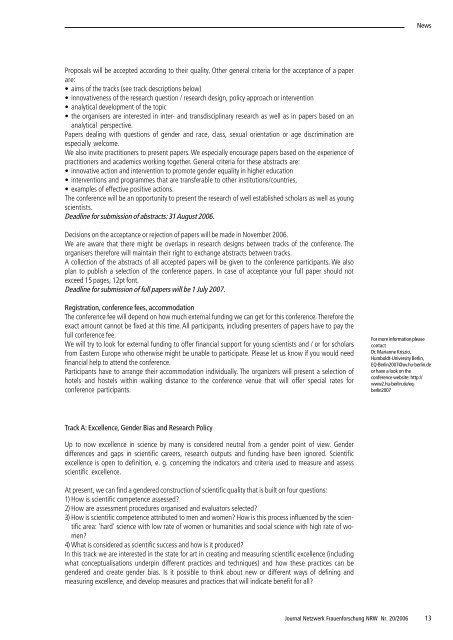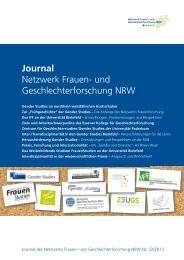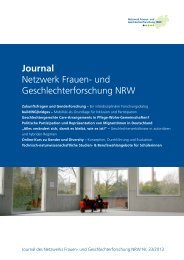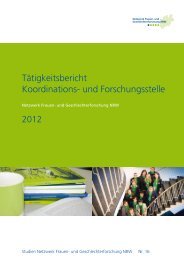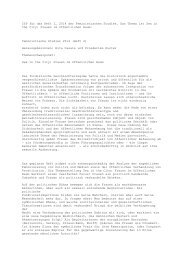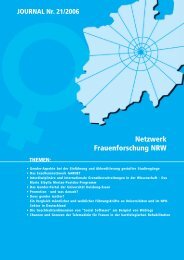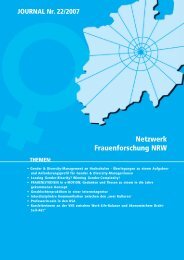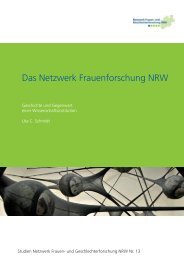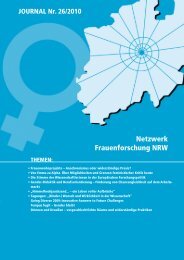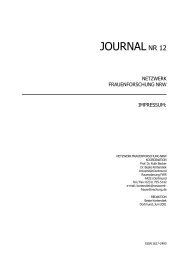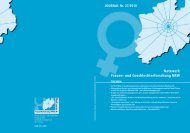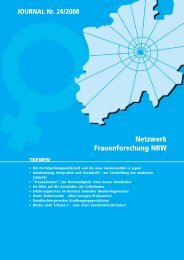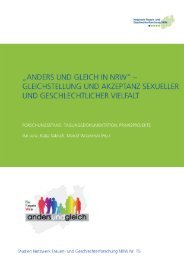THEMEN: Netzwerk Frauenforschung NRW JOURNAL Nr. 20/2006
THEMEN: Netzwerk Frauenforschung NRW JOURNAL Nr. 20/2006
THEMEN: Netzwerk Frauenforschung NRW JOURNAL Nr. 20/2006
Sie wollen auch ein ePaper? Erhöhen Sie die Reichweite Ihrer Titel.
YUMPU macht aus Druck-PDFs automatisch weboptimierte ePaper, die Google liebt.
Proposals will be accepted according to their quality. Other general criteria for the acceptance of a paper<br />
are:<br />
aims of the tracks (see track descriptions below)<br />
innovativeness of the research question / research design, policy approach or intervention<br />
analytical development of the topic<br />
the organisers are interested in inter- and transdisciplinary research as well as in papers based on an<br />
analytical perspective.<br />
Papers dealing with questions of gender and race, class, sexual orientation or age discrimination are<br />
especially welcome.<br />
We also invite practitioners to present papers. We especially encourage papers based on the experience of<br />
practitioners and academics working together. General criteria for these abstracts are:<br />
innovative action and intervention to promote gender equality in higher education<br />
interventions and programmes that are transferable to other institutions/countries,<br />
examples of effective positive actions.<br />
The conference will be an opportunity to present the research of well established scholars as well as young<br />
scientists.<br />
Deadline for submission of abstracts: 31 August <strong>20</strong>06.<br />
Decisions on the acceptance or rejection of papers will be made in November <strong>20</strong>06.<br />
We are aware that there might be overlaps in research designs between tracks of the conference. The<br />
organisers therefore will maintain their right to exchange abstracts between tracks.<br />
A collection of the abstracts of all accepted papers will be given to the conference participants. We also<br />
plan to publish a selection of the conference papers. In case of acceptance your full paper should not<br />
exceed 15 pages, 12pt font.<br />
Deadline for submission of full papers will be 1 July <strong>20</strong>07.<br />
Registration, conference fees, accommodation<br />
The conference fee will depend on how much external funding we can get for this conference. Therefore the<br />
exact amount cannot be fixed at this time. All participants, including presenters of papers have to pay the<br />
full conference fee.<br />
We will try to look for external funding to offer financial support for young scientists and / or for scholars<br />
from Eastern Europe who otherwise might be unable to participate. Please let us know if you would need<br />
financial help to attend the conference.<br />
Participants have to arrange their accommodation individually. The organizers will present a selection of<br />
hotels and hostels within walking distance to the conference venue that will offer special rates for<br />
conference participants.<br />
Track A: Excellence, Gender Bias and Research Policy<br />
Up to now excellence in science by many is considered neutral from a gender point of view. Gender<br />
differences and gaps in scientific careers, research outputs and funding have been ignored. Scientific<br />
excellence is open to definition, e. g. concerning the indicators and criteria used to measure and assess<br />
scientific excellence.<br />
At present, we can find a gendered construction of scientific quality that is built on four questions:<br />
1) How is scientific competence assessed?<br />
2) How are assessment procedures organised and evaluators selected?<br />
3) How is scientific competence attributed to men and women? How is this process influenced by the scientific<br />
area: 'hard' science with low rate of women or humanities and social science with high rate of women?<br />
4) What is considered as scientific success and how is it produced?<br />
In this track we are interested in the state for art in creating and measuring scientific excellence (including<br />
what conceptualisations underpin different practices and techniques) and how these practices can be<br />
gendered and create gender bias. Is it possible to think about new or different ways of defining and<br />
measuring excellence, and develop measures and practices that will indicate benefit for all?<br />
News<br />
For more information please<br />
contact<br />
Dr. Marianne Kriszio,<br />
Humboldt-University Berlin,<br />
EQ-Berlin<strong>20</strong>07@uv.hu-berlin.de<br />
or have a look on the<br />
conference website: http://<br />
www2.hu-berlin.de/eqberlin<strong>20</strong>07<br />
Journal <strong>Netzwerk</strong> <strong>Frauenforschung</strong> <strong>NRW</strong> <strong>Nr</strong>. <strong>20</strong>/<strong>20</strong>06 13


